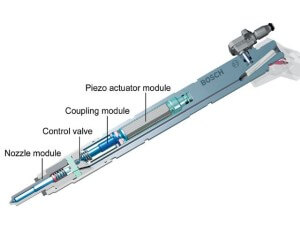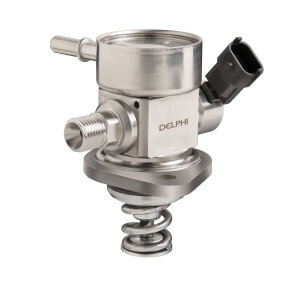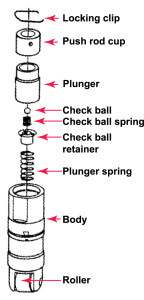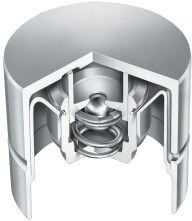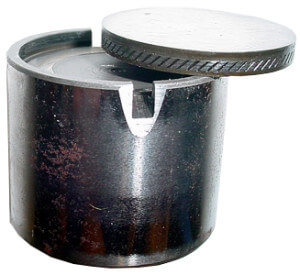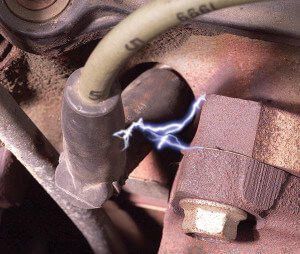Engine ticking noise — Most common causes
Engine makes ticking noise
Regardless of the make and model of your car, you may encounter an engine ticking noise situation. Owners report the engine ticking noise is usually worse when the engine is cold. Sometimes the engine ticking noise goes away as the engine warms up, but in other cases, it remains. Here are some possible causes and fixes.
Engine ticking noise caused by Gasoline Direct Injection components
Newer GDI engines have a different style of fuel injector and these fuel injectors make an engine ticking noise, especially on cold start-up.
GDI injectors are mounted so they inject gas directly into the cylinder instead of in the intake manifold. Because the gas is injected during the compression stroke, they operate at a much higher pressure, as high as 2,000 psi. There are two styles of GDI
injectors, solenoid, and piezoelectric. Both make a ticking sound, but owners seem to complain more about Piezoelectric injectors. If you do the diagnostics listed below and find the noise is coming from your injectors, you’ll just have to chill out. There’s nothing you can do to eliminate the engine ticking noise if its from your injectors.
Also, GDI engines have two fuel pumps; low-pressure and high-pressure. The low-pressure pump moves gas from the tank to the high-pressure pump. The high-pressure pump takes gas from the tank and boosts it to 2,000 psi. The high-pressure pump runs off a 3-lobe portion of the camshaft. As you might imagine, it takes a lot of energy to generate 2,000 psi.
That’s why using the right oil is critical in these applications. If you switch away from the factory-recommended oil, you can cause substantial wear to these 3 cam lobes and that will make an engine ticking noise. Even if the cam lobes are in good shape, the high-pressure fuel pump makes an engine ticking sound even when it’s in good shape. Again, there’s nothing you can do about this.
Hydraulic lifter leakdown and wear
Hydraulic lifters eliminate the need for periodic valve lash adjustments. They self-regulate valve lash due to the clearance between the body and the cup and the amount of backpressure during push rod operation.
Hydraulic lifters transfer mechanical action from the camshaft
to the push rod or valve stem. The lifter contains a body filled with engine oil and a cup mounted upside-down inside the lifter body. As the body is pushed up by the cam lobe, the engine oil exerts an equal amount of force on the cup, which moves the push rod. Overhead cam engines sometimes use a hydraulic bucket lifter. The operation is similar to a typical cam/push rod lifter, where the body is pushed by a cam lobe and the engine oil exerts an equal amount of pressure on the cup, which them moves the valve stem.
Hydraulic lifters can make an engine ticking noise under the following conditions:
Push rod pre-load is incorrect. If the pre-load is too loose, they will make noise when cold or hot. If the pre-load is too tight, they may make noise when cold, but it tends to make less when hot.
Pre-mature wear caused by extended oil change intervals or the wrong viscosity oil. Normal engine oil pressure keeps the lifter filled and the correct oil maintains the proper body-to-cup oil clearances. However, if the owner changes to a higher-viscosity oil, the thicker oil slows the flow of oil between the body and the cup during compression. That can cause an engine ticking noise. Similarly, if the oil is too thin, too much oil gets forced out between the body and cup, creating excessive valve lash, which also makes noise.
Obviously, neglecting oil changes causes premature wear between the body and cup and between the roller and cam.
Sludge and oil deposits in the oil gallery can reduce oil flow to the lifter, causing oil starvation. The lifter port can also accumulate debris and sludge. When a hydraulic lifter is starved for oil, it creates excessive valve lash and what you hear is metallic components crashing against each other.
Lifter leakdown. When the engine shuts down, the lifters slowly leak oil out of the intake port. If too much oil leaks out, the engine will start with too much valve lash and that makes an engine ticking sound. As the oil pressure rises and refills the body, the noise diminishes. Excessive leakdown is caused by wear, using the wrong oil viscosity, and sludge or deposits.
Improper valve lash
Whether you have a push rod engine or one with an overhead cam and
shim-style lifters, you must perform periodic adjustments to keep valve lash within specs. The valve lash is the clearance between the rocker arm and valve stem (pushrod engine) or between the cam lobe and the shim (overhead cam engine). If
the valve lash is off, and you’ll get an engine ticking noise. This is also called a tappet noise.
Low oil pressure
Crankshaft, camshafts, and piston rods ride on a cushion of oil film. The oil pump pushes oil into the bearings and the oil squirts out of the bearings at a certain rate of flow. The rate of flow depends on engine temperature, RPM, and torque. Stomp on the pedal and the extra torque squishes more oil out of the clearance. However, engineers design the lubrication system to account for all these conditions. In other words, the pump should always provide enough oil pressure and flow to maintain oil film strength between parts. Low oil pressure and lack of flow can cause engine ticking noise. Also, the wrong oil filter can reduce pressure or flow to the point where you encounter a slight loss of pressure.
Exhaust leaks
An exhaust leak can sound like a low rumble, but it can also sound just like and engine ticking noise.
Ping knock
Detonation or ping/knock is caused by using the wrong gas or from carbon buildup. It is most noticeable when the engine is under heavy load.
Spark plug wire/coil arcing
When spark plug wires or coil-on-plug boots
deteriorate, the high voltage arcs from the wire to the nearest metal component. This arcing sounds just like an engine ticking noise.
Diagnosing the cause
I could go into all kinds of specialized techniques, but the easiest way to nail down the cause of your engine ticking noise is to use and automotive stethoscope. Read this article to learn how to use one.
©, 2015 Rick Muscoplat
Posted on by Rick Muscoplat

